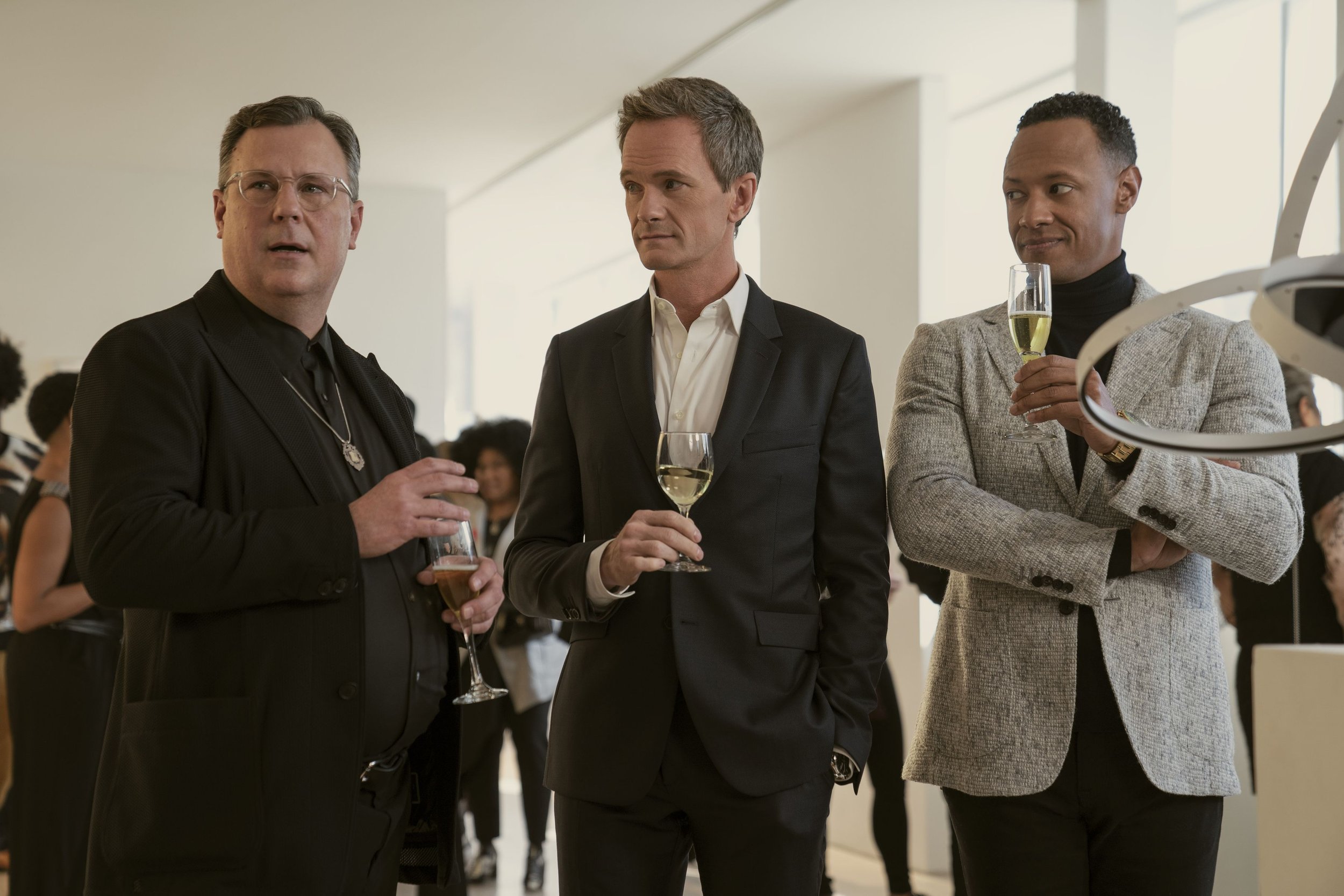EPISODIC REVIEW: Low Hanging Fruit: UNCOUPLED
By Arnold Wayne Jones
“I’m not on Grindr – it’s nothing but bottoms… and tops, who are also bottoms.”
That’s the kind of wisely catty one-liner that could only be written by a bitchy gay man of a certain age. It’s also low-hanging fruit when it comes to queer comedy: A bit femme-ist, racy but passable in polite company, and, ultimately, true (especially in Dallas). It’s also emblematic of what’s great and slightly disappointing about Uncoupled, the new eight-episode Netflix series from iconic showrunner Darren Star.
Star made his TV bones with Beverly Hills 90210 and Melrose Place, the ‘90s prime-time meta-soaps targeting Gen-Xers. They were meta, because the melodrama didn’t derive from middle-aged adult tropes about over-privileged 40-year-old cheating on their alcoholic wives involved in hit-and-run accidents during a corporate merger. No, they were about aspirational twentysomethings cheating on their girlfriends after binge-drinking before a big job interview. He rolled back the clock a decade or two and found relatable cliches with a less juicy, more supportive and, frankly, bland tone.
Star then really hit the jackpot with Sex and the City – unlike the hour-long network dramas 90210 and Melrose, a 30-minute cable sitcom where he could be as ratched as he wanted with nudity and language that was shocking for its era. S&tC was a Zeitgeist show that set a benchmark for bougie white girls to fetishize. It showed complicated characters who were also archetypes: The Cougar (before that was a thing), the Prude, the Career Woman and the Single Girl, trying to navigate the world of dating in their 30s.
The recent reboot of S&tC moved those characters into their 50s, which is also what Star has done with Uncoupled, only with a X-chromosome. (The Simpsons famously satirized Sex as being “about four women who act like gay men,” so Uncoupled just removes that filter.) Michael (Neil Patrick Harris) is the clingy half of a couple 17 years into a relationship. He throws a surprise 50th bday party for his partner Colin (Tuc Watkins), only to find out seconds before that Colin has moved out and is leaving him. Michael finds himself being forced to navigate the monkeypox-infested waters of gay dating a generation later, while coping with self-worth and depression not just about being dumped, but dumped by someone he’s still in love with.
Surprise parties? Conveniently inconvenient plot reveals? An awkward toast where we (and the central parties) are the only ones who “get” the subtext? Fish-out-of-water plot points? In the land of sitcom cliches, this isn’t even low-hanging – it’s apples that have already hit the ground and are getting soft on one side.
Uncoupled torpedoes into its complications so recklessly, you’d think Ryan Murphy had a hand in it. (Maybe he did: Murphy has a deal with Netflix, and maybe his style set the template for other content.) We haven’t even “met the characters at the point where we are supposed to have feelings about them. There’s man-whore Billy (Emerson Brooks), schlubby Stanley (Brook Ashmanskas), self-absorbed gal pal Suzanne (Tisha Campbell) and the remote lover, Colin. If this sounds like a plug-n-play redux of Sex and the City, well duh. But if you love S&tC but wished it had more dick, what am I complaining about?
Well, the characters for one. Michael’s desperation comes across not as endearing but as sociopathic; Colin seems selfish and cruel, unworthy of Michael’s ardor; Suzanne is abrasive and tone-deaf when it comes to reading a room.
Uncoupled is sassy and fast-moving, but it also plays out more broadly and one-dimensionally than it needs to; it’s as if Carrie Bradshaw’s reflective voice-overs became all the dialogue, leaving little for us as viewers to ponder over or decipher. The expression on Harris’ face when Michael hears the news couldn’t be more of a mugging if it were done in Central Park at gunpoint. A lot of the performances, in fact, seem to be played more for three-camera “before a studio audience” sitcom style than the filmed version. (That’s apparent in the writing as well: A dinner party where Michael is solo becomes a two-hander convo between Harris and Marcia Gay Harden, as if no other guests exist; a therapy session lasts barely five minutes; entrances and exits sometimes are shot as if an audience is expected to laugh when a door opens.) Its look and feel are more Grace & Frankie than Will & Grace.
Nevertheless, Uncoupled is worth a look-see, if not a full-on binge, for its insightful if not wholly accurate portrayal of gay culture, especially as it pertains to single men over 40: “Hurt people hurt people,” Stanley snipes. There’s pain underlying the comedy here. It ain’t pretty, but it’s real.




